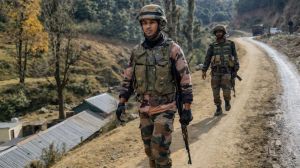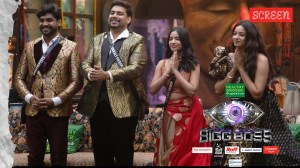Thinking Aloud
Soon after more than 100 of Baghdad8217;s artists gathered Monday at Hawar Art Gallery, its avuncular, irreverent owner, Qassam Alsabti, lu...

Soon after more than 100 of Baghdad8217;s artists gathered Monday at Hawar Art Gallery, its avuncular, irreverent owner, Qassam Alsabti, lugged out a sprawling white board. He propped it against the wall, and his helpers carted in cut-off plastic bottles topped with paint.
In a break with the past 8212; and all its weary cliches and slogans 8212; nothing was scripted. Get to work, he motioned with a smile. And so they did. In green, black, red and yellow, the pent-up emotions of three decades of Saddam Hussein8217;s rule spread across a public canvas.
8216;8216;Freedom first,8217;8217; one artist wrote. 8216;8216;For the sake of democracy,8217;8217; wrote another. There was bitterness at the past: 8216;8216;Saddam fell, Iraq did not.8217;8217; There was anger at US forces: 8216;8216;Long live the Iraqi people and down with America.8217;8217; And in one corner, painted in red, was a portrait of a slain woman sprawled across a man8217;s lap, a victim of war painted by Karim Khalil.
8216;8216;It was like an earthquake, and we8217;re only beginning to see its impact.8217;8217; For the artists like Khalil gathered in the gallery of stucco walls and stone floors, a new era had dawned in Baghdad. But for a community that prides itself on understanding the soul of the city, no one seemed to know what would come next.
Gone were the subtle battles with censorship that gave rise to an almost imperceptible language of dissent over 35 years. Gone, too, was the modicum of privilege the artists enjoyed under Saddam if they chose not to defy his rule. Ahead was hope for a newfound freedom of expression and an end to the isolation that made proud Baghdad a backwater.
Some eagerly predicted a renaissance that evoked the glory of Baghdad8217;s lusty poets and original thinkers. There were also ominous signs for this group. Some spoke of the chaos and looting that wrecked the city, most painfully its national museum and library.
Others questioned US intentions. Many worried about resurgent religious forces and their ability to end the secularism that gave Baghdad an artistic liberty that has gradually receded in most Arab cities.
8216;8216;We are starting from the beginning,8217;8217; said Alsabti, who over the weekend, sent out word to his friends and colleagues to gather at his gallery, an island of calm in turbulent Baghdad.
A nationalist and iconoclast, he had an overtly political intention in mind 8212; to form an artists8217; union and begin a weekly newspaper that would take its name from his gallery 8212; Hawar Dialogue.
But in a city with no working telephone lines, no electricity and precious few means to communicate, it was an excuse to see friends and colleagues after weeks of war.
8216;8216;Thank God for your safety,8217;8217; one after another said as they shook hands. Alsabti was a gregarious host. 8216;8216;We8217;ve been looking for you for a week,8217;8217; he said. 8216;8216;What are your losses?8217;8217; he asked another. To more than a few, he divulged a ribald joke that prompted peals of laughter. 8216;8216;If I had a telephone, believe me, 1,000 people would have come,8217;8217; he said. But his cheer bore little resemblance to his mood.
Skepticism of the American presence is sharp. 8216;8216;When I see an occupier, am I happy? Looting the museum, burning the National Library, robbing the Saddam Centre for Arts?8217;8217; Hadi said.
The prospect of a new source of censorship was unsettling. For decades, Iraqi artists 8212; those willing to engage the state 8212; had searched for cracks in the system. Some like Khalil chose not to push the envelope. 8216;8216;You can express without declaring,8217;8217; he said.
For much of the 1990s, Iraqi theatre was a forum for sometimes titillating criticism, a rare outlet for dissent in the state8217;s suffocating repression.
In one memorable play in 1998, Playground of the Hypocrites, an Iraqi was detained and asked to sit down by his interrogator. He was then told to confess. But, he asked, where is the boiling oil, the whips and the ceiling fan he should be hanging from? When told there was nothing of the sort, he warned his interrogator, 8216;8216;They8217;re going to fire you.8217;8217;
Hadi said he, too, tried to play along the edges. In 1996, he completed a sculpture of a tattered chair, fallen to the ground. Its back was iron bars, its legs were broken. It was meant to represent power, and it was rejected for a state-sponsored exhibition.
The artists mentioned words like 8216;8216;globalization8217;8217; and worried about what it meant for a country isolated since UN sanctions were imposed in 1990. They said they longed for modernity 8212; the Internet and cell phones 8212; but felt unsure about the impact of newfound freedom.
8216;8216;For decades, we were used to watching ourselves. Now you can think with words,8217;8217; said Mohammed Thamer, a poet. 8216;8216;But to talk loudly and to think loudly takes time. Freedom needs practice, and it takes practice to be free.8217;8217; 8216;8216;I don8217;t believe Saddam Hussein8217;s gone,8217;8217; said Mohammed Rasim, a painter. 8216;8216;He8217;s like God. Not because he8217;s good. But whenever we opened our eyes, we saw him, his picture, his sculpture, songs about him, poems about him. He was everywhere, even in dreams.8217;8217; LAT-WP
- 01
- 02
- 03
- 04
- 05































